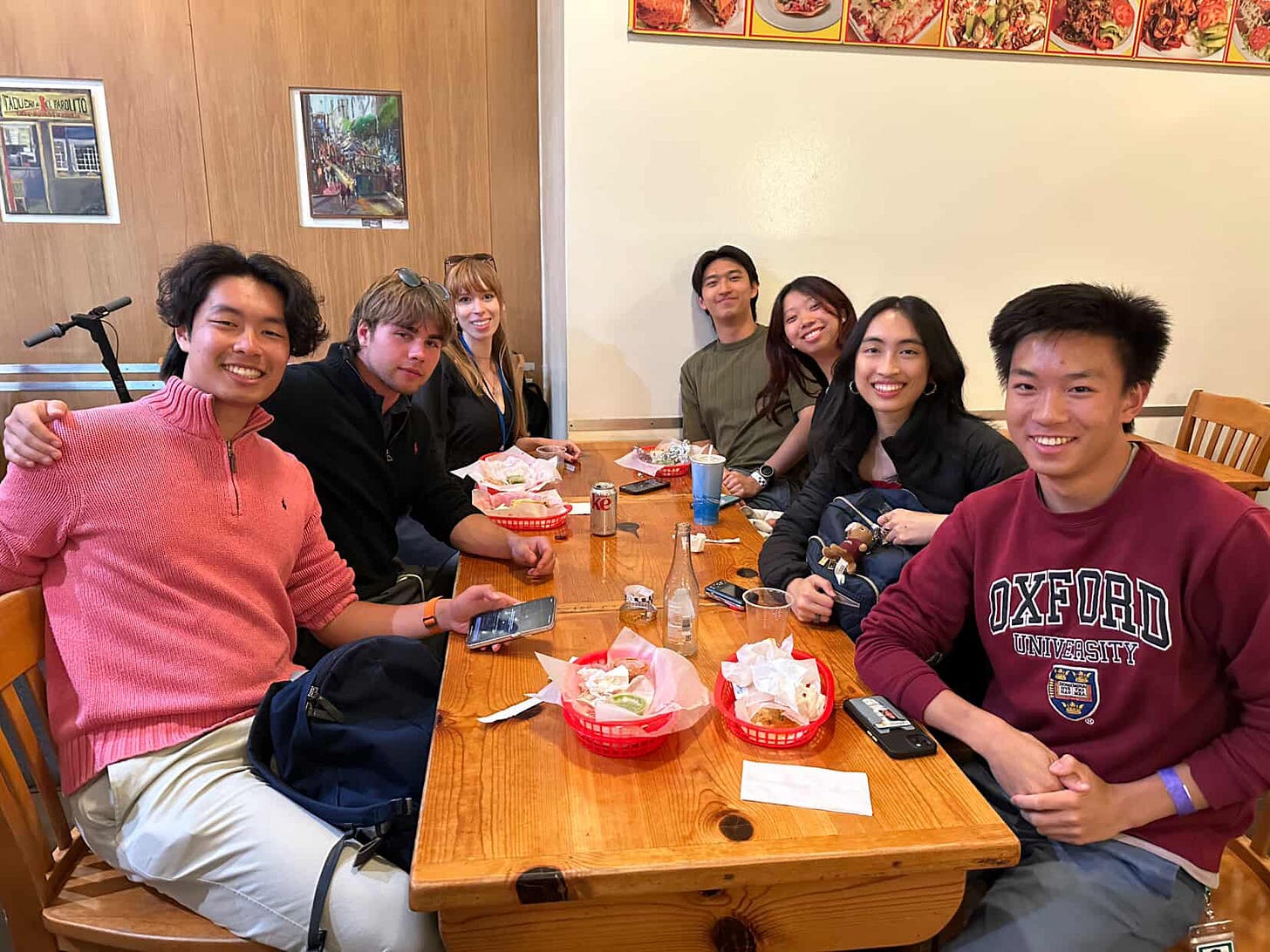SF Culture
some kid rambling about the tech capital
no bullshit, no AI - just me
this is a sketchpad rather than a polished essay. Just my thoughts that I got from everyday encounters.
what I define as thoughts is a tensor product of the people I met and the situations I got myself into. Might be total bs in math theory, but you get the point.
Some highlights of my SF trip:
Got stuck in a Trump protest
Andrej Karpathy and Michael Truel talks
Drunk Waymo ride
Friend raised preseed
Midnight trip to an ✨authentic✨ taco place
(stick around, there are photos at the end)
This trip was mostly free (shoutout YC) trial into the SF culture. Honestly - I liked it. For now I told myself I will move there at some point, but you never know where life could lead you.
Here are my main personal takeaways from the trip
Serendipity
Steep hill.
We were all tired and going from the AWS afterparty. I found a random taco place nearby. Software engineers aren’t exactly built for cardio, so every step came with some half‑serious complaints.
When we got up, this is what we saw
I whispered, “Great view,” and someone replied between gasps, “Steep hill, huh?”
When we were enjoying the view, we struck up a conversation with 4 other kids our age, and it turned out they were MIT and here for their internships.
We were apparently headed to the same taco place, and we got some great food together. This situation is my personal proof that tech world is smaller than you think.
One of the main drive factors in success is luck, and in SF randomness is on another level. The “pay it forward” culture shows - people are not scared to interact with strangers. We have sparked conversations in the bakery queue (HR lady was really friendly), on the bus, even on the street with some crackhead - not the best experience but it was funny.
Randomness is a huge factor that you can never account for. I have accidentally met a YC founder whose place I took for my current internship at Iterate. Very interesting guy building in infrastructure. If you are reading this - yes I did reread the PG essays.
You could mesure this so called serendipity with a coefficient - let’s call it s
Imagine a city is a bag with marbles, and a golden marble is this cool situation/person you are looking for. Chance of pulling a golden marble out of a bag is a lot higher if there are more of these marbles in the bag.
Sounds simple, but many people forget it
YC Starup school
I always forget that this was the main reason I went to SF. The talks were generic, and it was more about personal takeaways rather than what speakers actually said. I have met a lot of interesting people on the event, and I hope I will meet them again.
It was cool seeing Sam Altman in person, but he essentailly said “Build startups and don’t copy OpenAI (you won’t be competititve)”
The two talks I liked the most were by Andrej Karpathy and Michael Truel
Andrej mostly talked about the new paradigm he called “software 3.0”, which essentially is English written code. He monstly emphasized that we have entered an era where we are working in a validation loop with LLMs and need to now adapt to the new ways of development. Documentation for LLMs, more detailed prompts, and the “autonomy slider” are all things we need to consider in the development. What we currently need to work on is the GUI for LLMs. Currently, the main interraction with AI hasn’t changed much since the 90s - we are still using the same command line in a fancy UI wrapper.
Michael’s talk was inspiring, rather than informing. I caught young Zuckerberg vibes from him. He wasn’t bragging or humble, he was simply talking about what he has built and why he did it. His story shows the usual pattern - success never happens from first try.
Doing a startup
Obviously everyone is telling you to do a startup. Right now. Drop everything and start running around VCs raising your preseed.
At 5 AM, I often catch myself wondering, “Why aren’t you building something?” The honest answer is that I’m still learning. My internship at Iterate is sharpening my dev skills, and the books I read won’t be wasted - they’re laying the groundwork for whatever I choose to build later
- “But building is the best way to learn”
Yes and no. Jumping the gun with starting a startup might be a suitable option for some people, but not for me. I made a choice to learn when I can, and will execute when I choose to. There should be a balance between practice and studies.
People say that there is no playbook for startups, but I think there is one. It has four words on the front page - “Build. Iterate. Show. Build”. It also gives you paper—you can write in it, tear it off and make origami, or even burn it. Your call.
One principle I follow with life is taking everything one step at a time. Getting overwhelmed is never helpful - humans are not built for multitasking. I talked to over 20 founders over the past month - from YC/preseed to series B. All of them are different, but there is one thing they all agree on
”If you are not thinking about your startup all the time it won’t work out”
This paragraph is just a collection of thoughts I have on startups. I think raising money is the easiest part, and the hardest part is staying sane while everything around you feels like it’s on fire. It’s keeping your team aligned when no one’s slept, making calls under uncertainty, and still showing up every day to move the needle. The real challenge isn’t launching—it’s enduring.
“There are few sources of energy so powerful as a procrastinating college student.”
- Paul Graham
August 2025 would be a good month.
Elitism
This one is interesting. Not sure if some people from London have noticed, but I am clearly seeing an elitism culture around SF. If you are not running a moderately successful startup / work at big tech / quant, people lose interest in you quickly.
But the hype is real. Getting into YC or closing a pre‑seed round now seems to carry more prestige than landing a FAANG job ever did. Too many people chase that prestige rather than a genuine desire to solve problems—or even to make money. My hot take: if you have to pick a superficial motivator, chasing money is healthier than chasing clout.
I started all of my intros by simply saying that I am a student, and when I saw that a person still gave a shit about me, I told them more about my other experiences and work. If namedropping changes someone’s view on you - you are not talking to the right person. People who are interested in your personality as much as a professional life are the real ones. What I noticed a lot is that people put value on others based on how impressive their CV sounds. As much as I understand this, I value my own view of the person much more than wherever he/she is working or what startup they are doing. You can tell how smart and interesting a person is by the way they speak.
<sounds silly>
I guess I haven’t noticed this in London because the bar is generally lower. There are not as many “cracked” people, hence it is a bit more inclusive and more “beginner friendly”. In SF you are competing with YC founders, kids from Stanford and other smarties, whereas in London it is mostly Imperial people and bigtech SWEs.
</sounds silly>
I don’t like the term “cracked”, but I feel like it fits the description the best
Would I live there?
I don’t like the windy weather. I don’t like that there is a lot of homeless people (walking through tenderloin was an experience). I don’t like paying $9 for a coffee. I don’t want to get shot :(
but there is a good side..
the insanely smart people, the waves (I surf), the concentration of talent, the startup bubble - they all far outweight everything else
I will be back, sooner or later.
Here are the promised photos if you didn’t forget:







Introducing yourself as generic ‘x’ in your case *student*, is such a good way to assess other people’s intentions.
Also you often get a much better reaction when you delay detailing your achievements!
Nice post bro!
HELLO i just found this hahaha. still one of my summer highlights ;) now look at how things turned out this season hehe, glad to hear that YC was a decision you made on your own timeline 🫡 when i found you on linkedin i was so proud